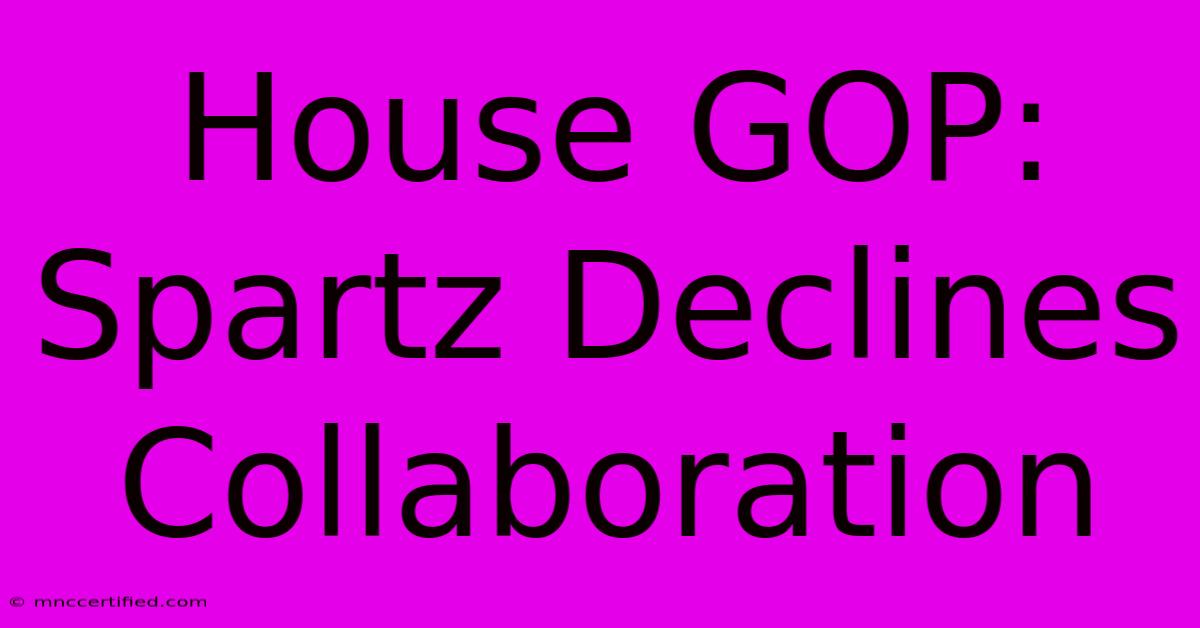House GOP: Spartz Declines Collaboration

Table of Contents
House GOP: Spartz Declines Collaboration – A Deep Dive into the Political Fallout
The recent refusal of Representative Victoria Spartz (R-IN) to collaborate with House Republicans has sent shockwaves through the GOP, sparking intense debate and speculation about the underlying reasons and potential consequences. This article delves into the intricacies of this political development, analyzing its implications for the party and the broader political landscape.
Understanding the Context: Spartz's Refusal and its Implications
Representative Spartz, a Ukrainian-born Republican, publicly declined to participate in certain House GOP initiatives, citing concerns about internal party dynamics and leadership. This decision, though seemingly minor on the surface, carries significant weight, potentially impacting the party's legislative agenda and its ability to present a united front. Her refusal highlights internal divisions within the Republican party and raises questions about its ability to effectively govern.
Key Concerns Raised by Spartz
While Spartz hasn't explicitly detailed all her reasons, her public statements suggest concerns about:
- Lack of Transparency: She reportedly expressed concerns about a lack of transparency and open communication within the House GOP leadership. This suggests a deeper issue of trust and collaboration within the party.
- Internal Conflicts: Her decision hints at underlying power struggles and disagreements on strategy within the Republican caucus. This fragmentation could weaken their overall effectiveness.
- Focus on Ukraine: Given her background and vocal support for Ukraine, some speculate her concerns may stem from disagreements on the party's approach to foreign policy, specifically regarding aid to Ukraine. This highlights a potential ideological clash within the party.
Analyzing the Political Fallout: Short-Term and Long-Term Effects
Spartz's actions have immediate and long-term ramifications for the House GOP.
Short-Term Impacts:
- Weakened Legislative Efforts: Her refusal to collaborate directly impacts the party's ability to pass legislation, particularly on issues where her vote would be crucial. This could lead to legislative gridlock.
- Damaged Party Unity: The public nature of her dissent creates a perception of internal division, potentially undermining public trust and support for the Republican party.
- Increased Media Scrutiny: The situation has attracted significant media attention, further highlighting the divisions within the GOP and potentially damaging their image.
Long-Term Implications:
- Erosion of Party Discipline: If Spartz's actions inspire other Republicans to similarly defy leadership, it could lead to a significant erosion of party discipline and cohesion.
- Shifting Power Dynamics: Her defiance could reshape the internal power dynamics within the House GOP, potentially empowering more moderate or independent voices.
- Impact on Future Elections: The internal strife could negatively impact Republican prospects in future elections, especially if the party appears fractured and unable to present a unified message.
The Broader Political Landscape: National and International Ramifications
Spartz's decision extends beyond the confines of the House GOP, impacting the broader political landscape both nationally and internationally.
National Implications:
- Increased Polarization: The incident contributes to the already high level of political polarization in the United States, further dividing the electorate.
- Impact on Midterm Elections: The internal divisions within the Republican party could influence the outcomes of the upcoming midterm elections.
International Implications:
- Foreign Policy Uncertainty: Spartz's concerns regarding Ukraine policy could create uncertainty in US foreign policy regarding the ongoing conflict. This could impact international relations and alliances.
Conclusion: Looking Ahead
The situation surrounding Representative Spartz's refusal to collaborate with House Republicans represents a significant challenge for the party. Whether this is a singular incident or a symptom of deeper, more systemic issues within the GOP remains to be seen. The coming months will be crucial in observing how the party addresses these internal divisions and their impact on the broader political landscape. The long-term consequences could significantly reshape the future of the Republican party and its ability to effectively govern. Further analysis and observation are needed to fully understand the lasting effects of this political rift.

Thank you for visiting our website wich cover about House GOP: Spartz Declines Collaboration. We hope the information provided has been useful to you. Feel free to contact us if you have any questions or need further assistance. See you next time and dont miss to bookmark.
Featured Posts
-
Pub Chain Seeks Guinness Supply Solution
Dec 18, 2024
-
Chelsea Starting Xi Real Madrid Clash
Dec 18, 2024
-
Janis Timma Dead Impact On Anna Sedokova
Dec 18, 2024
-
Chelsea Star Mudryk Fails Drug Test
Dec 18, 2024
-
Mark Cavendish Family Life Revealed
Dec 18, 2024